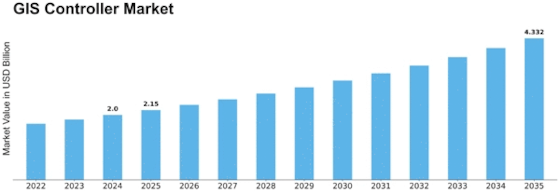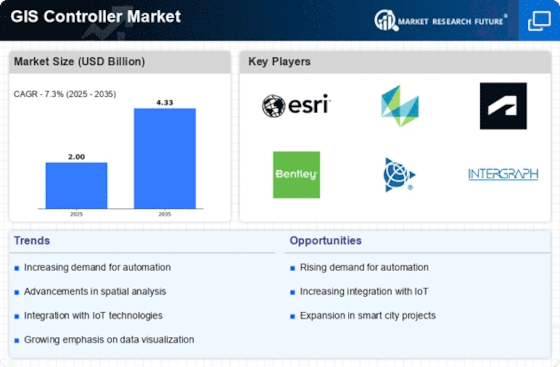Gis Controller Size
GIS Controller Market Growth Projections and Opportunities
The elements of the GIS controller are still up in the air by a large number of impacting factors. A significant determinant driving business sector development is the raising requirement for exact and cutting-edge geospatial data in assorted areas. The extension of the market is impelled by the way that areas including metropolitan preparation, horticulture, ecological observing, and calamity the executives depend vigorously on GIS controller to gather, process, and decipher geographic information.
Innovative headways significantly affect the market for GIS controllers. Because of the continuous development of equipment and programming parts, makers are obliged to keep a main situation with regards to advancement. By coordinating state of the art functionalities, for example, ongoing information handling, high-accuracy GPS, and improved availability, GIS controller keeps on being significant and pursued. The consistent rivalry among market members to carry out best in class advances impacts the development and level of contention of the GIS regulator industry in general.
Moreover, government strategies and drives significantly affect the GIS controller market. State run administrations across the globe are designating assets towards the execution of GIS innovation to reinforce their abilities in spaces, for example, foundation arranging, metropolitan turn of events, and debacle the board. The arrangement of this help encourages a great environment for the extension of the market, considering that speculations from the public area help in the improvement of GIS applications in different fields.
Openness and moderateness of GIS innovation are urgent market determinants. As creation costs decline and assembling processes become more smoothed out, GIS controller becomes more open to a more extensive assortment of clients. The mix of this cost-adequacy and drives to smooth out UIs empowers specialists from different areas to coordinate GIS innovation into their functional cycles, subsequently expanding the market's extension and possible customers.
Expanding monetary reliance and globalization impacts the market elements of GIS controller. As ventures extend their exercises on a worldwide scale, the interest for thorough geographic information expansions to work with very much educated independent direction. By giving a stage to the worldwide examination of spatial information, GIS controllers empower this; thus, global partnerships and associations with global tasks think of them as basic instruments.
Manageability drives and natural contemplations are impacting the market for GIS controllers. Protection, farming, and ranger service are among the areas that rely upon GIS controller to screen the climate and oversee assets in an economical way. As per the rising spotlight on ecological responsibility, the market gives regulators including particular functionalities custom fitted for applications like natural surroundings preservation and accuracy farming.
The cutthroat elements among significant market members additionally impact the market for GIS controllers. Solid rivalry supports the advancement of novel items by convincing makers to consolidate particular credits and functionalities. The ceaseless mission for mechanical advancement and upgrades in item usefulness encourages a dynamic and consistently changing business sector climate.
Normalization and interoperability are critical determinants of the GIS controller market. With the rising coordination of GIS applications into different work processes and frameworks, interoperability with different innovations and programming arrangements turns into a basic necessity. Normalization tries to work with the smooth coordinated effort of GIS controllers with different stages, subsequently encouraging a bound together and interoperable geospatial biological system.
Furthermore, market factors are affected by the administrative climate. Producers should rigorously comply with industry guidelines and norms to ensure the accuracy and reliability of GIS controllers. Administrative changes, including those relating to information protection and security, can possibly impact both item improvement and market acknowledgment.
An intermingling of variables, including mechanical headways, government drives, reasonableness, globalization, and ecological worries, impacts the GIS controller market. The connection among these components creates a dynamic and moderate climate, which pushes headways and extension on the lookout for GIS controllers. With the rising acknowledgment of the meaning of geospatial data across ventures, it is guessed that the market will go through additional advancement in response to developing requests and mechanical advancement.


















Leave a Comment